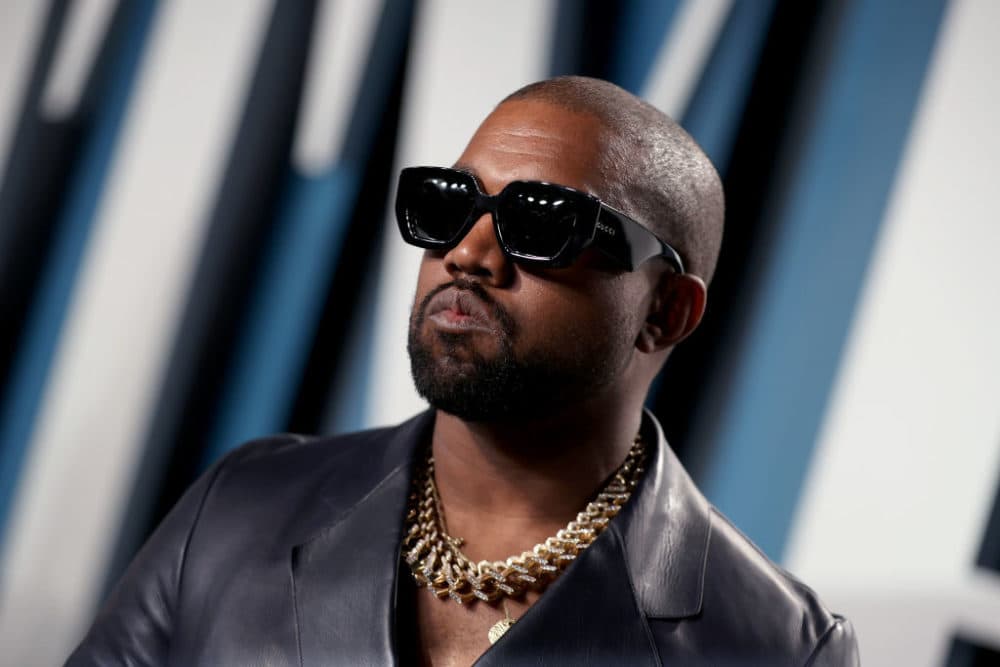Advertisement
'Mental Illness Is Not An Excuse, But It Is A Reason': How To Talk About Kanye West’s Behavior
Resume
When Kanye West hit his stride back in 2007, people perceived the well-respected rapper’s outlandish comments and behaviors as part of his schtick.
West offered hip-hop fans something different with his unique production, cadence and sarcasm, says music critic Naima Cochrane.
“It felt then — which is very different now — like Kanye was kind of in on the 'Kanye is an a------' joke,” she says, “which was actually part of the persona.”
In 2018, West revealed he has a mental illness. Some mental health advocates are now pushing for the media to reexamine how it covers West's actions like his comments about slavery, President Trump and his running for office.
One of those advocates is Bassey Ikpi, author of “I'm Telling the Truth, But I'm Lying.” She says her own experience of being hospitalized because of bipolar disorder has impacted her view of West.
For Ikpi, it’s difficult to watch the rapper make headlines for causing an uproar. Every time this happens, she almost immediately recognizes his behavior as a manic episode in the same way a diabetic person can identify diabetic shock in someone else.
This makes her feel compassion toward West. But when people talk about his actions, she says it’s upsetting to see that people “only care about mental health when we like the person who's experiencing it.”
People speak about West in unkind, graceless ways that lack empathy and justify it because they disagree with what he’s saying, she says. West will never read the millions of tweets he receives when his mania sparks controversy — but other people will.
“Your neighbor who's experiencing a mental health crisis sees. Your sibling who has not been able to tell you or find the language to tell you sees you,” Ikpi says. “All these people that you do have an impact on are seeing the way that you treat this person. And they're either going to hide from you, they're going to dismiss their own feelings, or they're going to feel as though they're not worthy of empathy and kindness and grace and forgiveness.”
Many of West’s critics want to hold him accountable for his actions, with some calling him a misogynist or attention-seeking. While Ikpi doesn’t refute these allegations, she says his actions are “heightened by his illness.”
When someone needs medical help for an issue like a diabetic shock, for example, people don’t disagree with their actions or opinions before making sure they receive care, she says. The notion of holding West accountable for his actions during manic episodes puzzles her because his mental illness impacts the way he behaves and thinks.
“Mental illness is not an excuse, but it is a reason,” she says. “And it has to be contextualized. It has to be framed so that people understand that the way that one behaves is the literal definition of what a mental illness is.”
Some people perceive that West has access to top-notch medical treatment but doesn’t utilize it, which sparks resentment, she says. But because West can’t hear these responses due to his illness and lack of presence in the conversation, “there's no space for accountability.”
Since West is too big for the media to ignore, conversations surrounding his behavior need to also include mental health and bipolar disorder because of West’s openness about his diagnosis, she says.
Journalists should talk to doctors about symptoms, she recommends, because a lot of people don’t know the signs of bipolar disorder. People get stuck on textbook definitions of mental illnesses and use them to determine whether someone deserves empathy, she says.
Symptoms don’t look the same for every person with bipolar. Ikpi doesn’t organize rallies or dive into right-wing conspiracy theories during periods of mania and paranoia, but she sometimes tweets nonstop for hours or calls someone repeatedly to ensure they’re not mad at her.
When Ikpi was first diagnosed with bipolar, she found it difficult to connect with other people in the Black community who shared similar experiences. This is part of why she believes visibility matters.
Ikpi says her level of privilege allows her to be vulnerable and transparent about her mental illness, which isn’t the case for everyone. To awaken people’s empathy without pity, she can serve as a mirror that reflects when someone experiences a similar feeling or a window to show what people with bipolar go through.
Honest conversations about mental illness and its impact on the Black people, who are “pathologized and criminalized in ways that other people are not,” require context, she says. Neglecting to look at the complete picture isn’t fair to West — nor to anyone else.
“He's the most visible person with a bipolar diagnosis in the world right now,” she says. “So he represents more than just someone that people are projecting onto. He represents all of us.”
Cristina Kim produced this story and edited it for broadcast with Tinku Ray. Allison Hagan adapted it for the web.
This segment aired on July 29, 2020.

